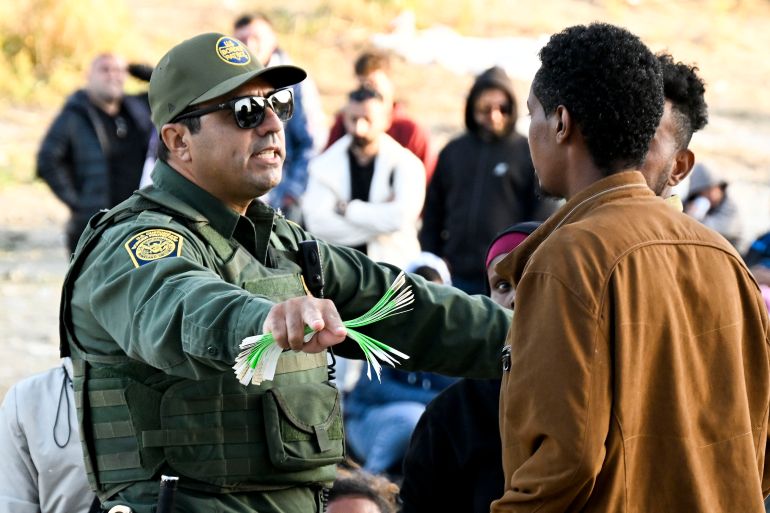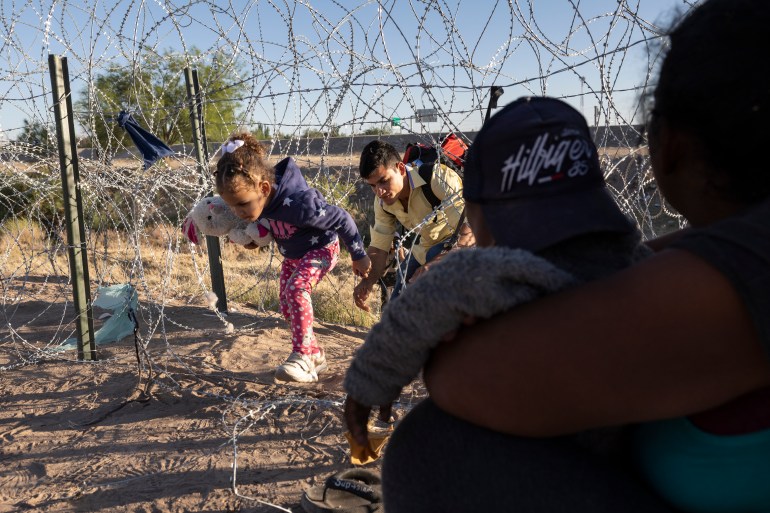US unveils rule that rights groups say stifles access to asylum
Rights advocates say long-anticipated policy is return to hardline Trump-era border curbs, urge Biden to change course.

Washington, DC – US President Joe Biden’s administration has finalised a new rule that will make most migrants and refugees arriving at the country’s southern border with Mexico in search of protection ineligible to seek asylum in the United States.
The Department of Homeland Security (DHS) said on Wednesday that the rule, which will disqualify people from seeking asylum in the US if they did not first apply in countries they crossed earlier in their journeys, will go into effect late on Thursday.
Keep reading
list of 3 itemsBiden administration issues proposal to restrict asylum seekers
Biden’s asylum ban: The view from the Darién Gap
That coincides with the expiration of a contentious public health order known as Title 42, which since 2020 has allowed US authorities to expel most people crossing the border without offering them the opportunity to apply for protection.
“This administration has led the largest expansion of legal pathways for protection in decades, and this regulation will encourage migrants to seek access to those pathways instead of arriving unlawfully in the grip of smugglers at the southern border,” Secretary of Homeland Security Alejandro Mayorkas said in a statement.
But rights groups quickly condemned the new measure, which had been anticipated for months, dubbing it an “asylum ban” that violated international and domestic law.
They also sounded a death knell for Biden’s campaign promise to take a more “humane” approach to migration than his predecessor, former President Donald Trump, who pursued hardline, anti-immigration measures at the US-Mexico border.
“The Biden administration’s pivot back to the Trumpian policies is complete,” Aaron Reichlin-Melnick, policy director at the American Immigration Council, wrote on Twitter.
“These new asylum restrictions mirrors in large part one of the Trump administration’s harshest anti-asylum policies, the 2019 asylum transit ban—which two separate federal courts struck down as unlawful.”
Laurie Ball Cooper, the US legal director at the International Refugee Assistance Project, added, “The Biden administration should be ashamed of pursuing Trump-era policies to unjustly deny protection to people seeking safety in the United States and return them to danger.
“The administration must immediately rescind this harmful and illegal rule.”
End of Title 42
The Biden administration has been under political pressure to respond to increased arrivals at the country’s southern border with Mexico, as Republican legislators blamed the Democratic president for the influx since he took office in January 2021.
Border crossings have already increased in advance of the end of Title 42, with a Biden administration official earlier saying that authorities were anticipating as many as 10,000 crossings a day after the policy expires just before midnight on Thursday.
Washington has sent 1,500 troops to the border to support agents there. They also sent more DHS security staff, including 1,400 personnel and 1,000 processing coordinators, to the border.
“Right now we believe we have a robust plan, a multi-agency plan, to do this in a humane way,” White House spokesperson Karine Jean-Pierre told reporters on Tuesday, stressing that Washington is pursuing a policy of “enforcement, deterrence and diplomacy”.
Meanwhile, the Biden administration has framed the new measure unveiled on Wednesday as a “rule to incentivise use of lawful immigration pathways”.

It pointed to a recent decision to allow as many as 30,000 people from Cuba, Haiti, Nicaragua and Venezuela to legally enter the US each month, provided they apply in advance and meet certain criteria, as one such “lawful” pathway.
But rights groups have criticised that policy because it was combined with an announcement that Mexico had agreed to take back 30,000 asylum seekers from those four countries each month if they sought to cross the US border irregularly.
Following a call between Biden and Mexican President Andres Manuel Lopez Obrador on Tuesday, the White House said Mexico City had committed to continuing to accept expelled people from those countries after the expiration of Title 42.
The Biden administration also recently announced plans to open migration centres in Colombia and Guatemala, which will be staffed by US agents, a move that accompanied plans to expedite screenings and deportations of those who cross into the US but do not qualify for asylum.
On Wednesday, Mayorkas said Washington was launching a “digital advertising campaign in Central and South America to counter the lies of the smugglers”, as well.
“We are making it very clear that our border is not open, that crossing irregularly is against the law, and that those who are not eligible for relief will be quickly returned,” he told reporters.
Under the new asylum rule, people crossing the border will not be considered to have sought a lawful pathway if they did not first apply and get an appointment via the CBP One app.
Authorities said the rule will not apply if a person can establish “it was not possible to access or use the CBP One app due to specific and extraneous circumstances, significant technical failure, or other applicable exception”.
It also will not apply to unaccompanied minors, or anyone who sought but was denied asylum in another country, according to the Department of Homeland Security.
“The rule presumes those who do not use lawful pathways to enter the United States are ineligible for asylum and allows the United States to remove individuals who do not establish a reasonable fear of persecution or torture in the country of removal,” the department said. “Individuals may also rebut the presumption by demonstrating exceptionally compelling circumstances.”
Speaking on Wednesday, Mayorkas added that those pursuing such a rebuttal would “have to meet a higher bar” than those who apply for asylum via other routes.